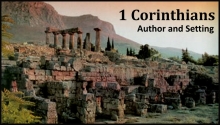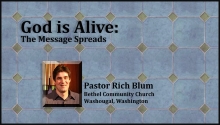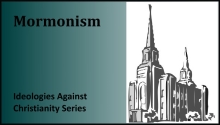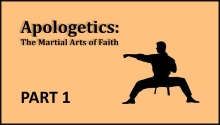
Who really wrote First Corinthians? It’s no mystery, I’m afraid. There is so much internal evidence to confirm this epistle was written by the apostle Paul -- it bears his name (1.1), fits his style, is true to Pauline theology, and historical circumstances permit the writing of this letter at this time. Some have argued that the authors overstatement of his qualifications (stating that he is “called,” an “apostle,” by “the will of God”) is unusual for Paul and indicates that the author may be overstating his case to be believed as Paul. As intriguing as a good conspiracy theory is…

SANCTUARY IN CORINTH During his second missionary journey, while on the run from murderous Jews, Paul found sanctuary in Corinth (about CE 51). Corinth was an unlikely rest stop for many reasons. First, being strategically located at a narrow channel of land between the Mediterranean and the Ionian Sea (see illustration 1), it controlled the province of Achaia. As such an important crossroads of the Roman Empire, it was one of the largest cities of its day – second only to Rome – with a population of 100,000 (80,000 in the city proper, and 20,000 in the immediate suburbs).

“Jesus said ‘Come to me, all you who are weary and burdened, and I will give you rest’ (Matthew 11.28). I am so thankful that Jesus did not call us to a list of rules or a religious agenda or even to church. He called us into a relationship with Himself.” So states Rich Blum, pastor of Bethel Community Church in Washougal, WA. Each Sunday Think-Biblically.com is bringing you sermons from Pastor Rich to assist you in your worship of God and to grow in your relationship with Jesus. Sermons also aired on KPDQ-FM AM 1130 in Portland, OR.

All this week we have been introducing the concept of apologetics and comparing it to martial arts. The analogy is a good one, both require learning, practice and experience to master. Furthermore, the techniques at the early stages are helpful to everyone, while the more advanced are useful only to those committed to the lifestyle. Today I’ll outline a course of study that will be beneficial to every believer, from those who simply want to live a peaceful life according to Romans 12.18 and to those who want to go on the offensive for God’s kingdom as per 2 Timothy 1.12-14:

“Jesus said ‘Come to me, all you who are weary and burdened, and I will give you rest’ (Matthew 11.28). I am so thankful that Jesus did not call us to a list of rules or a religious agenda or even to church. He called us into a relationship with Himself.” So states Rich Blum, pastor of Bethel Community Church in Washougal, WA. Each Sunday Think-Biblically.com is bringing you sermons from Pastor Rich to assist you in your worship of God and to grow in your relationship with Jesus. Sermons also aired on KPDQ-FM AM 1130 in Portland, OR.

Our final ideology under examination is Mormonism, once the fastest growing religion in the United States, adds on average 800 coverts to its rosters every day. Its growth is largely attributed to its conservative family and political values, the care provided to members, charitable contributions, and the financial success of its followers. More of its over six million members are involved in mission’s work than evangelical Christians and distributes five million copies of the Book of Mormon every year. How does one argue against a faith that many well-meaning people, including Sean Hannity, believe is simply a branch of Christianity?

In most philosophy, world-view or apologetics classes world religions are studied and arguments for and against them are examined. Topics such as nihilism, existentialism, and even eastern pantheistic monism are dissected. While this line of study can benefit one committed to becoming an apologist, for the mainstream believer there may be more immediate and practical concerns. In the case of western Christianity, the three most encountered ideologies opposed its teachings are evolution, Islam and Mormonism. We will examine the basic arguments of each of these over the next few days before turning to a defense of Christianity and the Bible.

One of the many jobs I held down while a freshman in college was as a sales associate for Kinney Shoes. What was expected to be a busy shopping day turned out to be extraordinarily slow, and as a result we were over staffed. The store manager, assistant manager and another sales person and myself were all waiting near the back of the store, trying not to scare off casual shoppers. The manager made mention of a belief in evolution, which prompted my interest and one of the most well-reasoned arguments for God my 19-year-old mind could think of.

Upon his arrival in Corinth, Paul met new friends, a Jewish couple, Aquila and Priscilla by name. They were from Rome, originally, but relocated to Corinth when Claudius (who reigned AD 41 to 54) “had ordered all the Jews to leave Rome.” This edict was pronounced in AD 49 or 50, though the circumstances are largely unknown. According to Suetonis, a Roman biographer of emperors, there was a constant series of Jewish riots. The reason for these riots is uncertain, but appeared to center around an individual named Chrestus.

In our primer on ideologies opposed to western Christian teachings we come to Islam. Since Islam is now the fastest growing religion in America (overtaking Mormonism in the winter of 2001) we must ready ourselves to defend the faith before them, communicate the gospel to them, and guide them into a personal relationship with Jesus. We must learn to address them with courage, righteousness and love if we are to successfully turn them from the darkness of their ideology and toward forgiveness in Christ. Addressing Islam will be the greatest challenge the western church will face for the foreseeable future.

We have said it here many times before, that conflict with the world is inevitable for the practicing Christian. This simple truth may not be remarkable, but it seems that from time to time the body of Christ needs to be reminded of it. In this age of Islamic violence, however, it may serve our readers best to define what kind of conflict is permissible by Kingdom standards. Sometimes the best way to define a concept is to illustrate it.

Last week we examined what it means to be spiritually “fit” and learned how to be properly motivated to exercise our faith beyond the basics. We even recommended some ways in which you might act on your faith, growing stronger and deeper in your relationship with God. Today I’ll introduce you to what some might consider the martial arts of faith – apologetics. This involves defending the truths of the Christian faith using a variety of methods including historic truth, revealed truth and even logic. Being an apologist it isn’t for everyone, however, the basics should be practiced by every believer.
